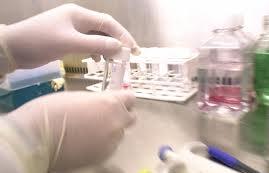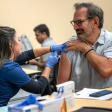
Four researchers have been named among the 2011 recipients of CTSI’s Clinical Research Services-Pilot Research Awards for Early Career Investigators for research funding made available to young academic scientists. Each individual award provides up to $10,000.
As part of the Clinical Research Services (CRS) program’s efforts to foster innovative research ideas and increase opportunities for new scientists, these awards provide the necessary resources for investigators who propose projects with the potential for high impact to healthcare practice and policy. It is anticipated that this funding will also help facilitate the conduct of translational research for early career investigators to establish pilot data to supplement current funding, as well as to secure larger grants.
Since the Spring of 2010, the CTSI CRS has funded 12 awards to early career investigators in diverse areas of research which include: medication beliefs on biologic therapy in a diverse rheumatoid arthritis cohort; identification of adverse events via an interactive patient managed phone; effectiveness of non-supervised training exercise program (INSTEP) in children with cystic fibrosis; feasibility of an intervention to reduce sexual risk behavior among high-risk transgender women; and effects of gastric bypass surgery on calcium metabolism and the skeleton.
Comments from awardees:
Congratulations to the four Fall 2011 awardees:

The effects of phthalate exposure on placental development in early pregnancy: a unified approach combining in vitro and in vivo analyses. (Mentor: Susan Fisher, MD)
Work will be undertaken simultaneously in vitro and in vivo to identify the effects of phthalate exposure in early pregnancy on placental development and function. Phthalates have been measured in >99% of pregnant women in the U.S. and have been associated with birth and fetal outcomes including the timing of labor, increased risk of delivery by Cesarean section, decreased anogenital distance in boy babies, and adverse effects on behavior and IQ in school age children.”

Evaluation of Biomarkers of Radiation Exposure in Patients Treated with 131I-MIBG. (Mentor: Kate Matthay, MD)
This study proposes to evaluate potential blood-based biomarkers of radiation exposure in patients with neuroblastoma or pheochromocytoma undergoing 131I-MIBG treatment. Metaiodobenzylguanidine (131I-MIBG) is a targeted radiopharmaceutical specifically taken up by tumors that overexpress the norepinephrine transporter (NET). 131I-MIBG is one of the most active agents for patients with relapsed or refractory neuroblastoma or pheochromocytoma. Potential biomarkers of response and/or toxicity following 131I-MIBG therapy have not been evaluated. Such markers are critical as 131I-MIBG therapy is being evaluated in combination with other systemic agents and will soon be incorporated into treatment protocols for patients with newly diagnosed high-risk neuroblastoma.

Micro-particles as biomarkers for osteonecrosis of the femoral head in sickle cell disease. (Mentor: Carolyn Hoppe, MD)
This observational study will explore the relationship between microparticle (MP) levels in Sickle cell disease (SCD) patients with and without osteonecrosis of the femoral head (ONFH) by testing the hypothesis that cell-derived MPs) are involved in the development of ONFH in SCD and thereby serve as a predictive marker. Despite the relative frequency of ONFH in SCD, few predictors or biomarkers indicating progression of this clinical complication exist. The mechanisms leading to the development of ONFH in SCD are poorly understood, but are undoubtedly related to intravascular coagulation and microcirculatory thrombosis. MPs are emerging as an important surrogate marker of endothelial dysfunction and thrombosis, with potential predictive and prognostic value for SCD-related complications.

Oxytocin and unhealthy interactions in family of patients with recent-onset schizophrenia: A novel biomarker and pharmacological intervention to reduce negative expressed emotion. (Mentor: Sophia Vinograd, MD)
Schizophrenia is a chronic, severe neuropsychiatric illness that significantly impairs quality of life. This study will investigate an innovative, translational, pharmacological intervention of a well-known risk factor for relapse in schizophrenia: family environments with high negative “expressed emotion (EE). High EE, characterized by parental criticism, hostility, lack of warmth, and emotional over-involvement, appears to interact with the neuro-pathophysiology of schizophrenia. Psychosocial interventions to reduce EE improve clinical outcomes, but are costly, labor-intensive and only modestly effective. We will investigate the role of the neuro-peptide oxytocin in the interactions of families of children with schizophrenia using a novel strategy.
The CTSI-CRS Pilot Research Award for Early Career Investigators is a component of the CTSI's Strategic Opportunities Support (CTSI-SOS) program, and all awards are funded by the CTSI SOS. Information on future application cycles is available UCSF RAP website, and more inforamtion on the CRS program is avaialable here.




